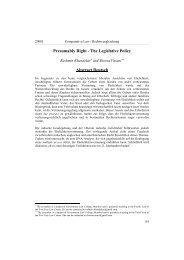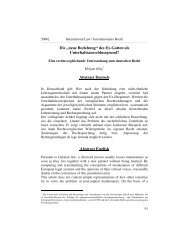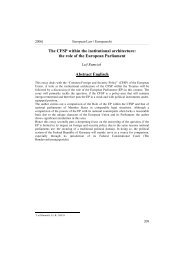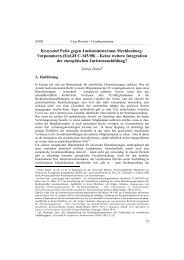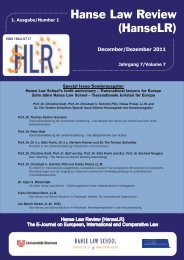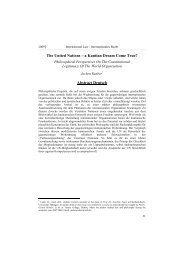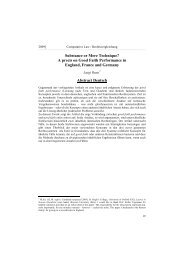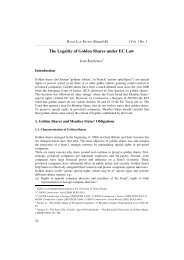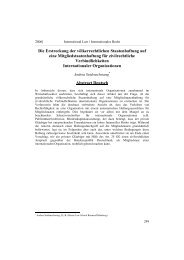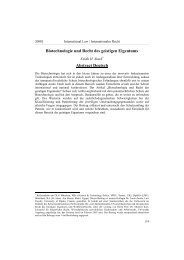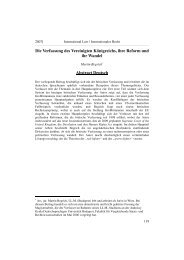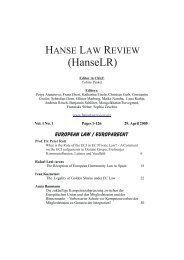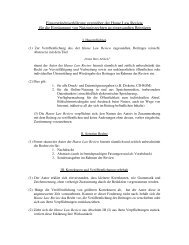The United Nations – a Kantian Dream Come True? - Hanse Law ...
The United Nations – a Kantian Dream Come True? - Hanse Law ...
The United Nations – a Kantian Dream Come True? - Hanse Law ...
You also want an ePaper? Increase the reach of your titles
YUMPU automatically turns print PDFs into web optimized ePapers that Google loves.
2009] International <strong>Law</strong> / Internationales Recht<br />
___________________________________________________________________________________________________________________________________________________<br />
functions a clear separation of powers does not exist. As to the enforcement system, the UN<br />
organs’ means lack the degree of coercion which public powers in a nation state usually<br />
dispose of. <strong>The</strong> only public power comparable to its domestic counterpart is the Security<br />
Council. In the case of an actual opt-out however, the range of its enforcement competences<br />
is limited: it might enforce the most basic UN principles even against non-members but not<br />
their assistance in any action taken against other states. 177 Considered in light of the<br />
<strong>Kantian</strong> categories outlined above, the UN Charter establishes an organisation which has<br />
long since exceeded the character of the ‘negative substitute’, the league of nations, and is<br />
constantly <strong>–</strong> but slowly <strong>–</strong> on its way towards the ‘positive idea of a world republic’. 178<br />
Especially recent developments as for instance a legislating Security Council and the<br />
establishment of a further permanent Court under the roof of the UN, the International<br />
Criminal Court, illustrate this UN tendency towards statelihood on a global level.<br />
ee) <strong>The</strong> UN Competences<br />
<strong>The</strong> competences of the UN have been set up and developed alongside the given goals of<br />
the organisation. <strong>The</strong>refore much of what would have to be said here has already been<br />
explained above. 179 I will just reiterate two crucial deviations from the <strong>Kantian</strong> ideal: On<br />
the one hand UN practice has extended the initial competence of interstate peace-keeping to<br />
a competence to engage in regional conflicts, at least where severe violations of human<br />
rights are to be expected or have already occurred - a competence that is not covered by<br />
Perpetual Peace. 180 On the other hand Kant would have (maybe wrongly) 181 rejected the<br />
General Assembly’s competences to make recommendations relating to ‘any matters within<br />
the scope of the present Charter’ (Art 10 UNC), including of course the promotion of<br />
friendly relations between nations, the advancement of economic development and driving<br />
forth state cooperation in social, educational, health and cultural fields (Art 13 UNC).<br />
V. Conclusion<br />
Neo-<strong>Kantian</strong>ism is a prominent stance in modern practical philosophy. In the recent works<br />
of Rawls, Habermas and Tesón the continuing relevance of <strong>Kantian</strong> ideas for the<br />
international case has been impressively illustrated. Yet, legal scholars have so far been<br />
reluctant to tackle the area from their own jurisprudential perspective. This indifference is<br />
objectionable as the <strong>Kantian</strong> approach <strong>–</strong> slightly reconsidered and further elaborated <strong>–</strong><br />
offers a solid basis for a normative theory of international organisations and a <strong>–</strong> if not the <strong>–</strong><br />
most plausible guideline for an evaluation of the UN structure in terms of legitimacy. At<br />
present, the <strong>United</strong> <strong>Nations</strong> does not entirely conform to this scheme. Partly however, the<br />
organisational evolution of the UN points to the enlightened ideal of a world republic:<br />
Based on a ‘constitutional’ Charter the <strong>United</strong> <strong>Nations</strong> establish a universal league of states<br />
for one main purpose: the enforcement of the <strong>Kantian</strong> peace imperative. <strong>The</strong> UN substitutes<br />
the modern ambition to construct a global rule of law for the security dilemma of the initial<br />
177 Ibid., n. 21.<br />
178 Based on a different interpretation of the legal status quo Höffe, ‘Ausblick: Die Vereinten Nationen im Lichte<br />
Kants’, 251 reaches the same conclusion.<br />
179 Recall the above argument at supra IV 1 b) and d).<br />
180 If such interventions for humanitarian reasons can be justified in terms of <strong>Kantian</strong> philosophy is currently<br />
discussed, see references in note 86.<br />
181 Cp. supra IV 1 d).<br />
75



